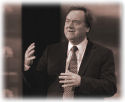The red/blue split for online voters is not 50/50, survey finds
A Pew Research survey released Sunday indicates that nearly half of all Americans have used electronic media to get or spread information about the presidential election. And those active Web users are looking more blue than red.
How much of Americans' news about this year's national elections comes from online sources, and which segment of the voting populace will that news most likely impact? That's the subject of a Pew Research study, conducted with Princeton Survey Research, that polled 2,251 Americans of voting age between April 8 and May 11 (Full report in PDF format available here.)
The big headline was that 46% of adults surveyed use the Internet in some form for politically-oriented discussion or motivation, including e-mail and social networking, with a margin of error of +/- 3%. Further details from the survey concentrate on just the Internet-using segment, with a margin of error of +/- 2%.
That segment tends to be comprised of younger adults who are more active online, who are more connected to other young adults online, and who may very well be more likely to vote Democrat this November.
As Pew's Aaron Smith and Lee Rainie report, "Young voters in our survey tend to gravitate toward the Democratic Party and the Obama campaign at greater rates than their elders, and their comfort engaging with the political world online is clearly in evidence in our survey. Online Democrats outpace Republicans in their consumption of online video (51% vs. 42%). Furthermore, Democrats are significantly ahead among social networking site profile creators: 36% of online Democrats have such profiles, compared with 21% of Republicans and 28% of independents."
Presumptive Democratic nominee Barack Obama seems to have the edge among those who use the Internet and cell phones regularly, the survey finds. Obama's campaign has used the Internet and text messaging to its advantage, especially when it comes to social networking.
The Internet may also be helping to bring voters in. A little over a fifth of voters polled say they would not be as involved as they are if not for the net, and a little over a quarter say it makes them feel more personally connected.
At the same time, however, those who say they depend on the net more for political news don't altogether trust it. Sixty percent agree that the Internet is full of misinformation and propaganda that too many voters believe is accurate. Thirty-five percent also believe that it allows those with the most extreme viewpoints to drown out more typical voter's views.
Pew said that three online activities stood out the most in their survey: First and foremost, 35% of all voters surveyed and 47% of connected voters surveyed have watched political videos, which is three times the number that did the same during the 2004 race.
One out of every 10 are using social networking sites to gather information, and six percent have made political contributions online, also up threefold over 2004 numbers.
Text messaging is also increasingly becoming a method to receive and send information on campaigns -- 8% reported doing so, although there is no baseline to compare it to previous surveys since it was the first time the question was asked.
"Younger online political users tilt in favor of the Democrats in general and Obama in particular, and that has a bearing on the partisan breakdown of online activity," Smith and Rainie wrote. "Simply put, Democrats and Obama backers are more in evidence on the internet than backers of other candidates or parties."
The survey was conducted at a time when Sen. Hillary Clinton was still an active Democratic candidate. Results showed that 74% of Obama supporters received most of their political news online, versus 57% of Clinton supporters and 56% of McCain supporters.
| BetaNews' legislative issues stories all this week are dedicated to the life and memory of Tim Russert, NBC News Washington Bureau Chief. Donations in his honor may be made to Catholic Charities USA. |  |